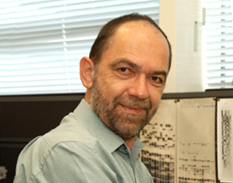Alec Jeffreys
File:Alec Jeffries BBC Radio4 Desert Island Discs 9 Dec 2007 b008fcdz.flac
Sir Alec John Jeffreys, CH, FRS (born 9 January 1950) is a British geneticist who developed techniques for DNA fingerprinting and DNA profiling which are now used worldwide in forensic science to assist police detective work, and also to resolve paternity and immigration disputes. His work had a profound impact on the legal system; DNA fingerprinting has been pivotal in solving many high-profile criminal cases and has also been used in determining family relationships, such as paternity cases.
Early Life and Education[edit | edit source]
Alec Jeffreys was born in Oxford, United Kingdom. He studied at the University of Oxford, where he received his bachelor's degree in Biochemistry. Jeffreys later pursued his PhD at the University of Oxford, focusing on the mitochondria of yeast. However, it was during his postdoctoral research at the University of Amsterdam that he made significant strides in understanding DNA.
Career and Research[edit | edit source]
In 1977, Jeffreys moved to the University of Leicester, where he made his groundbreaking discovery of DNA fingerprinting in 1984. This discovery came about as he was studying the structure of genes and noticed that certain sequences of DNA repeated next to each other and were unique to each individual. This led to the development of a technique that could identify individuals based on their DNA.
The first practical use of his discovery came in 1985 when DNA fingerprinting was used to resolve an immigration dispute, proving the family relationship. Shortly after, in 1986, it was used to solve a double murder case in the UK, which was the first time DNA fingerprinting was used in a criminal investigation.
Jeffreys' work revolutionized forensic science, making it possible to identify individuals with a high degree of certainty. His research also had significant implications for the study of genetics, biology, and medicine.
Awards and Honors[edit | edit source]
For his contributions to science, Alec Jeffreys has received numerous awards and honors, including being knighted in 1994. He is a Fellow of the Royal Society (FRS), a member of the National Academy of Sciences, and has received the Albert Einstein World Award of Science.
Legacy[edit | edit source]
Jeffreys' discovery of DNA fingerprinting has had a lasting impact on both science and society. It has transformed forensic science, provided new methods for solving crimes, and has been used in humanitarian efforts, such as identifying victims of natural disasters and conflicts. His work has also raised important ethical and privacy issues regarding DNA data.
See Also[edit | edit source]
Search WikiMD
Ad.Tired of being Overweight? Try W8MD's physician weight loss program.
Semaglutide (Ozempic / Wegovy and Tirzepatide (Mounjaro / Zepbound) available.
Advertise on WikiMD
|
WikiMD's Wellness Encyclopedia |
| Let Food Be Thy Medicine Medicine Thy Food - Hippocrates |
Translate this page: - East Asian
中文,
日本,
한국어,
South Asian
हिन्दी,
தமிழ்,
తెలుగు,
Urdu,
ಕನ್ನಡ,
Southeast Asian
Indonesian,
Vietnamese,
Thai,
မြန်မာဘာသာ,
বাংলা
European
español,
Deutsch,
français,
Greek,
português do Brasil,
polski,
română,
русский,
Nederlands,
norsk,
svenska,
suomi,
Italian
Middle Eastern & African
عربى,
Turkish,
Persian,
Hebrew,
Afrikaans,
isiZulu,
Kiswahili,
Other
Bulgarian,
Hungarian,
Czech,
Swedish,
മലയാളം,
मराठी,
ਪੰਜਾਬੀ,
ગુજરાતી,
Portuguese,
Ukrainian
Medical Disclaimer: WikiMD is not a substitute for professional medical advice. The information on WikiMD is provided as an information resource only, may be incorrect, outdated or misleading, and is not to be used or relied on for any diagnostic or treatment purposes. Please consult your health care provider before making any healthcare decisions or for guidance about a specific medical condition. WikiMD expressly disclaims responsibility, and shall have no liability, for any damages, loss, injury, or liability whatsoever suffered as a result of your reliance on the information contained in this site. By visiting this site you agree to the foregoing terms and conditions, which may from time to time be changed or supplemented by WikiMD. If you do not agree to the foregoing terms and conditions, you should not enter or use this site. See full disclaimer.
Credits:Most images are courtesy of Wikimedia commons, and templates, categories Wikipedia, licensed under CC BY SA or similar.
Contributors: Prab R. Tumpati, MD

